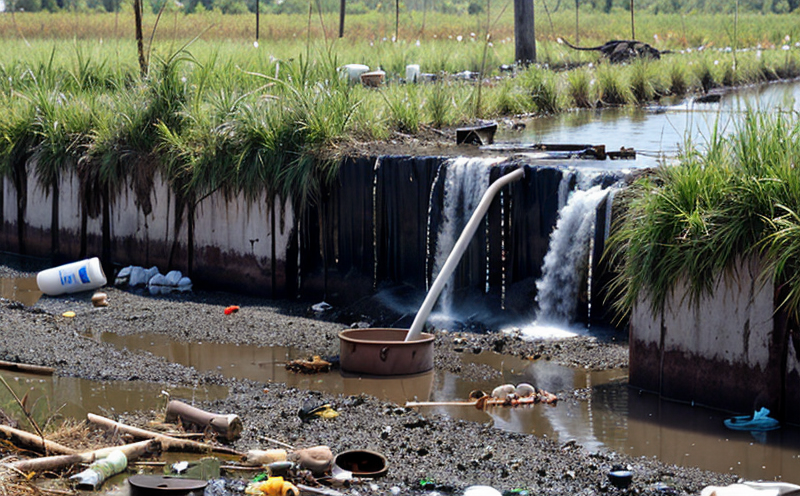Veterinary Drug Pollutant Testing
The testing of veterinary drug pollutants in the environment is a critical component of ensuring public health and environmental safety. Veterinary drugs, which include antibiotics, antiparasitics, and hormones, are often excreted by animals into wastewater systems. Once these substances enter the ecosystem, they can have long-lasting effects on both wildlife and human populations.
The presence of these pollutants in the environment poses significant risks to aquatic life, leading to antibiotic resistance and hormonal imbalances. The World Health Organization (WHO) highlights the importance of monitoring such pollutants through rigorous testing procedures. Compliance with international standards like ISO 18492, which sets guidelines for the analysis of veterinary drugs in water matrices, is essential.
Our laboratory employs advanced methodologies to detect even trace amounts of these contaminants. We utilize state-of-the-art instrumentation and a team of experienced chemists to ensure accurate and reliable results. Our approach involves multiple steps: sample collection, extraction, purification, and finally, analysis using high-performance liquid chromatography (HPLC) coupled with mass spectrometry (MS).
Sample preparation is crucial in this process. Properly collected samples must be handled under strict conditions to prevent contamination. This includes minimizing contact with air and ensuring that the sample remains stable until analysis. Once prepared, our lab uses HPLC-MS/MS techniques to identify and quantify veterinary drugs present. This technology allows for precise detection down to parts per trillion levels.
Our testing protocols are designed not only to meet regulatory requirements but also to provide actionable insights for stakeholders involved in animal husbandry and pharmaceutical manufacturing. By identifying areas where pollution occurs, our tests help in implementing targeted mitigation strategies. For instance, farmers can adjust their practices based on test results, while pharmaceutical companies may redesign products to minimize environmental impact.
Our service is particularly valuable for industries dealing with large-scale animal production or those involved in drug manufacturing and distribution. Regular monitoring ensures ongoing compliance and helps prevent incidents that could lead to broader ecological issues. The data generated from these tests can be pivotal in guiding policy decisions and supporting sustainable practices within the agricultural sector.
Benefits
Implementing veterinary drug pollutant testing offers numerous advantages across various sectors. For quality managers, it provides a robust framework for ensuring product purity and efficacy. Compliance officers benefit from having clear evidence of adherence to regulatory standards, which can enhance the reputation of their organizations in the market.
R&D engineers gain valuable insights into potential environmental impacts during early stages of development. This knowledge is crucial for creating safer products that minimize harm to ecosystems. Procurement teams also find this service beneficial as it supports responsible sourcing practices by identifying suppliers who adhere to stringent quality and safety standards.
The economic benefits extend beyond compliance alone. By reducing the risk of contamination-related recalls or fines, organizations can save substantial costs associated with non-compliance. Additionally, stakeholders are able to maintain a competitive edge in the marketplace through superior product offerings.
From an environmental perspective, our testing contributes significantly towards preserving natural habitats and promoting biodiversity. It supports efforts aimed at reducing antibiotic resistance by limiting the spread of pathogens within aquatic systems. This holistic approach aligns with global sustainability goals outlined by organizations like the United Nations Environment Programme (UNEP).
Why Choose This Test
Selecting our veterinary drug pollutant testing service ensures that you receive comprehensive and accurate analysis tailored specifically to your needs. Our team of experts uses cutting-edge technology combined with meticulous laboratory procedures, ensuring precise measurements even for minute concentrations.
We offer flexible service options catering to different client requirements whether it's routine monitoring or one-off assessments. With our expertise in multiple analytical techniques including HPLC-MS/MS and liquid chromatography-tandem mass spectrometry (LC-MS/MS), we can address diverse testing scenarios effectively.
Our commitment extends beyond just providing results; we also offer tailored recommendations based on the findings of each test. This includes suggestions for improvement where necessary, helping clients implement effective solutions promptly. Furthermore, our transparent communication ensures that all parties involved are kept informed throughout every stage of the process.
In summary, choosing our service means accessing unparalleled quality assurance measures supported by scientific rigor and innovation. It positions your organization at the forefront of sustainable practices while fostering trust among consumers and stakeholders alike.
Use Cases and Application Examples
| Scenario | Description |
|---|---|
| Routine Monitoring at Industrial Facilities | Continuous surveillance of wastewater from livestock farms or pharmaceutical plants to ensure compliance with local regulations. |
| Research and Development Projects | Preliminary studies on new veterinary drug formulations aimed at minimizing environmental impact during production. |
| Application Example | Description |
|---|---|
| Evaluation of Water Quality in Surrounding Areas | Detailed evaluation conducted after introducing a new veterinary drug to assess its potential effects on local ecosystems. |
| Supply Chain Audits for Sustainability Certification | Verification checks performed during certification processes ensuring all partners adhere strictly to environmental protection measures. |





